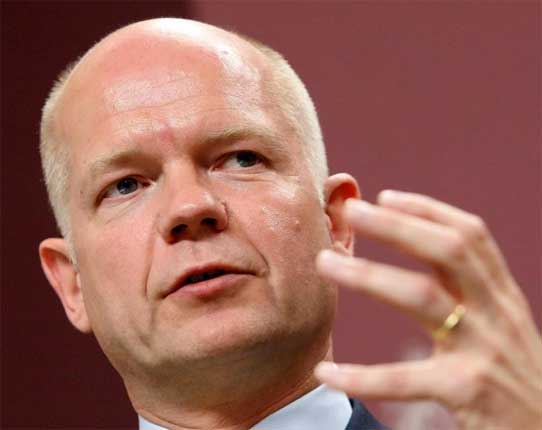Hague refuses to put timeline on operations in Libya

William Hague played down hopes of an early end to the Libyan conflict yesterday as he warned that the military campaign was not a computer game that could be switched off.
More than four months after Britain joined bombing raids on Muammar Gaddafi's forces, remarks by the Foreign Secretary echoed efforts by senior ministers to tone down earlier government rhetoric forecasting the Libyan dictator's imminent defeat. They are now braced for an involvement that could last many months, if not years.
Mr Hague, the most senior minister in Britain while David Cameron and Nick Clegg holiday abroad, said: "It's not a computer game where you are bored with it and you put it to one side. This is something you follow through in the real world."
He refused to put a timescale on the operation and denied splits among the countries backing Nato air strikes, saying: "No one should mistake our determination and unity in carrying this through to success."
His warning of hard grind ahead came the day after Liam Fox, the Defence Secretary, conceded that the rebel groups were unlikely to win a land war in Libya – and said that a palace coup was the best way of removing Col Gaddafi from power.
Early hopes in Western capitals that the Libyan leader would be swept away by the tide of democratic uprising across the Arab world have rapidly evaporated. There are fears of a military deadlock, with opposition forces too weak and too divided to advance on Col Gaddafi's stronghold.
Britain attempted last week to step up the pressure by expelling his diplomats from London and announcing Britain's recognition of the rebels' transitional government in Benghazi. But dangerous splits within the Libyan opposition ranks were demonstrated days later by the assassination of the rebels' military commander, Abdel Fattah Younes. Not yet fully explained, it has been blamed on Islamist-linked militia in his own forces.
Mr Hague yesterday told critics of the Libyan strategy: "[I] ask them to remember that in a conflict things do not go in an even manner, there are things that happen that disturb us, there are things that happen of course, that are unexpected, but we have to pursue this and go through to success."
The Foreign Secretary has already retreated on his aim of bringing Col Gaddafi to justice in an international court, suggesting he could remain in the country if that was what the Libyan people wanted.
Yesterday he insisted that the military action had been a success as it had saved "many thousands of lives and stopped the destabilisation of Egypt and Tunisia". He told BBC Radio 4: "What we have done so far has been a success in achieving the objectives of saving civilian life. Now we want to see a political settlement and that involves the departure of Col Gaddafi.
"So that is something we continue to work on and we'll continue to implement the UN resolution for as long as it is necessary to do so."
He pledged that Britain would "follow through" on its mission in Libya. But admitted: "We don't know how long it will be. We don't know when Col Gaddafi will see that he has to go. We don't know when members of his regime will come to that conclusion."
Join our commenting forum
Join thought-provoking conversations, follow other Independent readers and see their replies
Comments
Bookmark popover
Removed from bookmarks